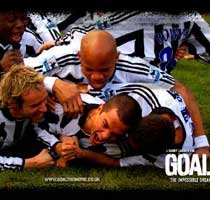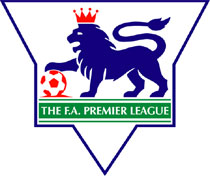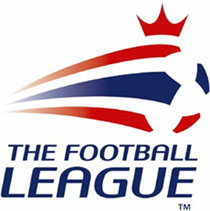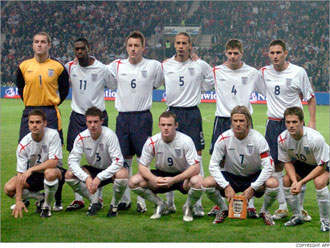Goal!《一球成名》(精讲之六)
影片对白

Commentator: Here comes Harris. And a goal. It's Harris. It's a dream start for Newcastle. And what a way to answer his critics.
Man: Goal! Goal!
Player: Come on.
voice: Number ten, Gavin Harris.
Commentator: Referee has given the foul. Free kick to Liverpool. And they've taken it quickly. It's a corner. A free header. Liverpool are level. 1-1.
voice: Goal-scorer for Liverpool, number 25, Igor Biscan.
Commentator: Newcastle has given the ball away yet again. Into Baros. He's got a chance to shoot here. Oh, it's in. Liverpool lead. 2-1. They've conceded two goals in quick succession without reply. That's a devastating blow for Newcastle. Now, can they come back from it?
Commentator: So, here we go. Second half, with Liverpool firmly in the driving seat. And that second goal has really knocked the stuffing out of the fans. Oh, it's a great chance for Gerrard. Oh, so close. Had that gone in, it would have been "Good night, Newcastle." Now it's Munez. The youngster's got some great skill. Trying a give-and-go here with Alan Shearer.
Gavin: Give it. Give it.
Dornhelm: Come on, pass. Pass.
Commentator: It's a goal. It is 2-2.
Barry: You beauty.
Commentator: The Great effort that’s by Newcastle. But remember, if it stays like this, it will still be Liverpool in Europe next season. Only three minutes to go now and Newcastle are running out of time. They've got to try and find a winner from somewhere.
Player: Back, come on.
Harmision: Come on, come on, come on.
Man: Go on, son. Have a poke.
Santiago: Let go.
Commentator: Free kick here, in a very dangerous area.
Crowd: Get him off. Took him down. Give him a card.
Commentator: Well a real chance for Newcastle, this. But who's going to take it?
Gavin: Hey, Santi. It's yours.
Commentator: I hope they know what they're doing. It's young Santiago Munez who’s stepping up, with only seconds left to play. And he must feel that the hopes of an entire city are resting on his shoulders.
Harmision: Come on, come on, come on.
Harmision’s mother: And I thought you didn't even like football.
Harmision: I know.
Commentator: Unbelievable. Newcastle's newest and youngest player gives the fans a brand-new song to sing.
妙语佳句,活学活用
1. Foul
这里指体育运动中的“犯规”。
2. Free kick
足球里的“任意球”。
3. Header
头球:足球赛中用头顶球来完成的传球或射门。
4. Be in the driving seat
这个片语的意思是“to be in control of a situation 掌有局面的控制权”,例如:The consumer is in the driving seat due to the huge range of goods on the market.
5. Knock the stuffing out of
这个片语也写作 beat / lick the hell / living daylights / shit / tar out of,意思是“Administer a merciless beating to; also, defeat soundly”,例如:The coach said he'd like to beat the living daylights out of the vandals who damaged the gym floor.
Bob knocked the stuffing out of that bully.
He swore he'd beat the tar out of anyone who tried to stop him.
6. Step up
“走出来,走上前来”的意思,例如:Step up to the podium, folks, and I'll show you how it works.
文化面面观
英国足球赛制
足球被称为英国的国球。作为一项全民喜爱的运动,英国足球从低到高,从业余到专业,有大大小小不同的赛制。
League system
The Premier League
The Premier League was founded in 1992 after England's top clubs broke away from the Football League in a successful effort aimed at increasing their income at the expense of clubs in the lower divisions. Links with The Football League were maintained, and each season the bottom three clubs are relegated from the Premier League and replaced by three from the Football League Championship.

The top two teams in the Premier League each season qualify for the next season's UEFA Champions League. The third and fourth placed clubs also qualify, but have to play in the final qualifying round before they can enter the group stage. The fifth placed club qualifies for the UEFA Cup (although in 2005-06 the fifth placed team, Liverpool, were also allowed into the Champions League as holders), and the sixth and seventh may also qualify if the winners of either the FA Cup or League Cup finish in the top four. The number of clubs qualifying for European competition is determined by UEFA and is based on results over the previous five seasons.
Winning the Premier League is considered the greatest honour in English football and guarantees qualification for the UEFA Champions League, Europe's elite club competition.

The Football League
Although the oldest league in the world, The Football League now ranks second in the hierarchy of English football after the split of England's top clubs in 1992 to form the FA Premier League. The Football League has 72 member clubs evenly divided among three divisions, currently named the Football League Championship, Football League One and Football League Two.
The English football league system
Below the Football League is what is commonly known as "non-League football". This term is confusing, as it refers to those clubs outside the (Football) League, although they still play in organised league competitions. In recent years, the top few levels have been consolidated into the National League System, operated by the FA. Many clubs in the Conference National division are fully professional, and many other clubs are semi-professional.
There is automatic promotion and relegation between League Two and Conference National, and for several levels below the Conference, although this becomes more irregular further down the league system. The non-League system is often known as the "pyramid", because the number of leagues at each level begins to increase as you go down through the levels, with each league covering a smaller geographic area.
Amateur football
Although the Football Association abandoned a formal definition of "amateur" in the early 1970s, the vast majority of clubs still effectively play as amateurs, with no financial reward. The Amateur Football Alliance is the largest organised of such competitions, being particularly strong in the London area.
Reserve leagues

Many teams operate reserve teams in separate leagues; in some lower levels of the pyramid, reserve teams play against first teams. The top division for reserve teams of professional clubs is the FA Premier Reserve League. Beneath that operate the Central League, and the Football Combination, which cover the north and south of England respectively.
Youth leagues
Many club sides have Academy (youth) teams; the top level of youth football is the FA Premier Academy League, consisting of Premier League and Football League club's Academy sides, which operates at U18 and U16 levels (although the latter is non-competitive). The next level below the Academy League is the Football League Youth Alliance, in which the remainder of Football League clubs field their youth teams. There is also the FA Youth Cup, a nationwide cup competition for U18 teams.
Beyond organised football
Football in England is not just a spectator sport or the preserve of official leagues and clubs, but a sport attracting mass participation at many different levels and in a wide variety of forms, including Sunday league football and five-a-side football.
Cup competitions
The two most important cup competitions in England are the FA Cup and the League Cup, but several other national cups are targeted at clubs at different levels.
The FA Cup, first held in 1872, is the oldest and most respected national cup competition in the world. It is open to around 600 clubs in the higher levels of the pyramid. The FA Community Shield is played each August as a one-off match between the FA Cup winners and the Premier League champions.
The League Cup (currently known as the Carling Cup) is England's second major cup competition, and is contested by the 92 Premier League and Football League clubs. The winners of both main cup competitions qualify for the UEFA Cup, and both are considered as important tournaments.
The Football League Trophy is a competition for clubs in Football League One and Football League Two.
The FA Trophy is open to clubs in the top four levels of the National League System, and the FA Vase is for clubs in the next couple of levels below that. These competitions replaced the FA Amateur Cup, which was the leading competition for amateur non-League teams for many years. Representative teams from leagues lower still, mostly at county level, contest the FA National League System Cup, and the FA Sunday Cup is for Sunday league football teams.
Qualification for European competitions
Clubs who do well in either the Premier League, FA Cup or League Cup can qualify to compete in various UEFA-organised Europe-wide competitions in the following season (as well as continuing to play in domestic competitions). The number of English clubs playing in Europe in any one season can range from seven to eleven, depending on the qualification scenarios. Currently, England is awarded the following places in European competitions:
Competition | Who Qualifies | Notes |
Club finishing 1st in the Premier League |
| |
Club finishing 2nd in the Premier League |
| |
UEFA Champions League Third Qualifying Round | Club finishing 3rd in the Premier League |
|
Club finishing 4th in the Premier League | If an English club wins that season's Champions League and finishes outside the top four, they go straight into the Champions League and the fourth-placed club instead goes into the UEFA Cup | |
Club finishing 5th in the Premier League | If the fifth-placed club has already qualified for Europe through the FA Cup or League Cup, then the next-highest Premier League finishers get this place | |
FA Cup winners | If the FA Cup winners have already qualified for Europe by a high Premier League finish or by winning the League Cup, then the FA Cup runners-up receive this place; if the runners-up have also already qualified, then the highest-finishing Premier League club to have not qualified for Europe gets the place | |
League Cup winners | If the League Cup winners have already qualified for Europe by a high Premier League finish, then the next highest-finishing Premier League club gets this place | |
Any English club that wins the UEFA Cup and has not already qualified for the Champions League or UEFA Cup | By the UEFA Cup regulations (Regulation 1.07), this club's entry into the UEFA Cup will not be at the expense of any other entries to which its national federation is entitled | |
UEFA Cup First Qualifying Round | FA Premier League club with the best UEFA Fair Play ranking that has not already qualified for Europe, but only if England has the best fair play ranking or has a fair play score of above 8 and is one of the two countries drawn out of the hat |
|
UEFA Intertoto Cup Final Round | Club finishing highest in the Premier League to have entered and not qualified for any other European competition | If the club finishes lower than four places below the last club to have qualified for the UEFA on the basis on league position, this place will be reallocated to another country; conversely, if another country does not take up their Intertoto Cup allocation, England may receive two places in the competition |
In addition, once in a European competition, it becomes possible to qualify for others:
All the winners of the Champions League Third Qualifying Round go forward to the Champions League
All the losers of the Champions League Third Qualifying Round go forward to the UEFA Cup
All the winners of the UEFA Cup Second Qualifying Round go forward to the UEFA Cup
All the winners in the Intertoto Cup Final Round go forward to the UEFA Cup Second Qualifying Round
Any clubs playing in the Champions League that finish third in the group stage go into the UEFA Cup Third Round
我观之我见

这是一部励志电影,相信观众们都能看得激情澎湃。即使只为了在电影中昙花一现的至少十位球星,这部电影也值得一看。
主人公自小热爱足球。作为一个偷渡客,一个在美国没有身份的人,一个只能靠打零工维持生计的人,Santiago仍然没有放弃对足球的热爱。他的坚持终于有了回报,被慧眼的球探发现之后,Santiago终于踏上了自己热爱的职业足球之路,并逐渐走向辉煌。
也许很多人会对Santiago的父亲不满,他阻止儿子去追寻自己的梦想。但是从一个男人对家庭的责任来看,父亲的做法也许并没有错。他是吃苦了一辈子的人,不会相信什么飞来横福,认为只有脚踏实地的生活才有保障,也不希望儿子太过相信梦想而受挫。毕竟,现实是残酷的,像这种天才一夜成名的故事还是凤毛麟角。古往今来,多少天才都在生活的洪流中消逝了踪迹,从未被发现,也永远不会被发现,连一声叹息都不会得到。
不过,有一句话还是说得不错的,没有梦想,生活就像折断翅膀的小鸟,再也不能飞翔。只要这梦想是脚踏实地的。
考考你
将下面的句子译成汉语。
1. Newcastle has given the ball away yet again. Into Baros. He's got a chance to shoot here. Oh, it's in. Liverpool lead. 2-1.
2. I hope they know what they're doing. It's young Santiago Munez who’s stepping up, with only seconds left to play. And he must feel that the hopes of an entire city are resting on his shoulders.
Goal!《一球成名》(精讲之五)考考你 参考答案
Hey, man, thanks for covering for me, yeah. You're a top man. If you fingered me, I was right in the shitter.
嗨,哥们,多谢你替我遮掩。你真是个大好人,要是你说出去的话,我就惨了。
We're even, OK? I don't owe you no more favors.
我们扯平了,明白吧?我不欠你任何人情了。
Hey you think I'm some greaseball who doesn't know stuff?
嗨,你以为我是什么都不知道的笨蛋吗?
相关文章
- Million dollar baby《百万美元宝贝》精讲之三
- Million dollar baby《百万美元宝贝》精讲之二
- Million dollar baby《百万美元宝贝》精讲之一
- The princess diaries《公主日记》1 精讲之六
- The princess diaries《公主日记》1 精讲之五
- The princess diaries《公主日记》1 精讲之四
- The princess diaries《公主日记》1 精讲之三
- The princess diaries《公主日记》1 精讲之二
- The princess diaries《公主日记》1 精讲之一
- From the earth to the moon《从地球到月球》精讲之五




 手机网站
手机网站